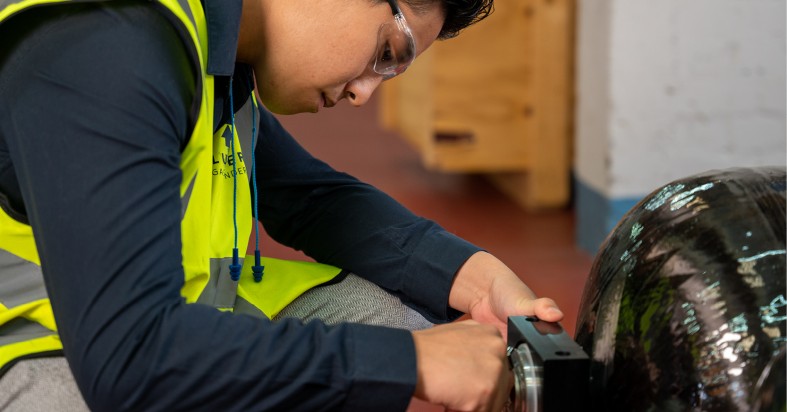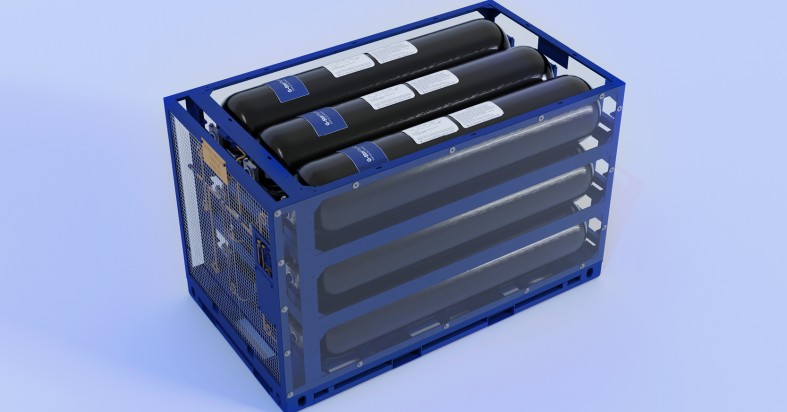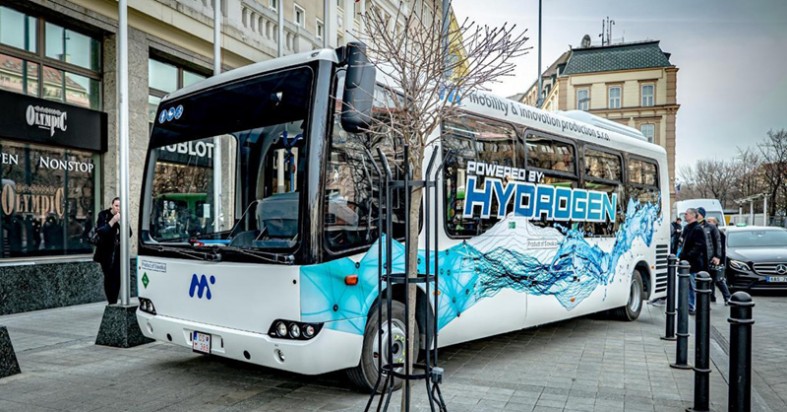US +1800 764 0366 | Europe & Middle East +44 (0)115 980 3800 | Asia-Pacific: +61 2 7227 5369

Here, Luxfer Gas Cylinders interrogates the key questions surrounding hydrogen adoption for the transport sector.
Why is hydrogen hard to transport?
Moving hydrogen from where it is produced, to where is it needed is one of the biggest barriers to using the clean fuel to help decarbonise the transport sector.
While natural gas is distributed via a network of pipelines to homes and businesses, reaching into parts of the UK and Europe, hydrogen has no such infrastructure in place yet.
Building such a framework is a significant, costly and disruptive undertaking. Yet limited access to hydrogen will curtail its use, and therefore impact on the ability to meet the Net Zero targets governments have put into place.
A ‘virtual gas pipeline’ is considered among the best options to plug the gap – with bulk gas transport modules comprised of hydrogen cylinders moving it using the existing road network or waterways.
Alongside this, huge progress is being made within the transport sector to allow trucks, buses, trains, tractors, refuse trucks, road sweepers, boats and other vehicles and vessels – plus drones – to operate with hydrogen technology via hydrogen fuel systems.
While battery electric is a cleaner, greener alternative to fossil fuels, it is not viable for all modes of transport, particularly for heavy industry, or where recharge will require excessive down time.

How will hydrogen be transported?
Transporting hydrogen gas poses a challenge due to its unique properties. Hydrogen has a low energy density compared to other fossil fuels such as diesel. This means that a larger volume of hydrogen is required to provide the same amount of energy as other fuels.
Alongside compressing the gas into high quality hydrogen cylinders, an alternative way to transport it is liquefaction. This is where hydrogen is cooled to a very low temperature of around -253°C, which transforms it into a liquid. This reduces the volume of hydrogen by a factor of up to 1,000.
This option is being explored particularly in extreme environments and for applications where space is at a premium, such as air and marine sectors.
Whereas natural gas is moved through pipelines, these would need to be specially designed and constructed for hydrogen, at significant cost. With uncertainty from government and investors on the role of hydrogen in the clean energy economy, ‘virtual’ gas pipeline solutions using high performance hydrogen cylinders are key to supporting adoption in the short to medium term.

Source: Mobility Innovation, 2022
Is transporting hydrogen dangerous?
Hydrogen is highly flammable and this means that ensuring safety of gas storage systems, and robust governance are fundamental.
The regulatory landscape has been a limiting factor for hydrogen take-up, however the new global regulation UN ECE R134 is an important milestone. Luxfer Gas Cylinders has achieved this certification, demonstrating its hydrogen cylinders and hydrogen fuel systems are safe for use in hydrogen-powered vehicles, across a wide range of applications.
Will hydrogen fuel take off in the transport sector?
The Hydrogen Council estimates that there will be 50,000 hydrogen-powered buses and 350,000 hydrogen-powered trucks on the world’s roads by 2030, with the UK among those countries helping to lead the way.
Two options to support hydrogen fuel for transport are being explored and invested in are fuel cell technology and conversions of combustion engines to work with hydrogen.
Hydrogen fuel cell vehicles harness the gas to generate electricity through a chemical reaction with oxygen in the fuel cell. The electricity generated powers an electric motor that propels the vehicle.
An advantage of this kind of application is that the only by-product of the chemical reaction is water, making it a zero emissions technology. It also offers similar performance and range to conventional gasoline vehicles, with the added benefit of fast refuel times.
Buses, trucks and forklifts are being developed by a number of manufacturers, harnessing this technology, with Luxfer Gas Cylinders designing and supplying bespoke hydrogen fuel systems.
However, a challenge within the transport sector is that operators have in the past decade invested in assets powered by fossil fuel whose lifespan exceeds carbon reduction targets, such as train and ship builders. In this case, retrofitting as a route to embedding hydrogen technology is an appealing option.
At Luxfer Gas Cylinders, the ratio of design and engineering resource to conversions versus new build hydrogen systems is around 50/50, and this isn’t expected to change in the next few years.
The benefit of retrofitting is that it’s possible to convert battery electric or diesel engines to hydrogen fuel systems relatively quickly and bring a product to market within months. Meanwhile, it might take a major manufacturer three years to get a prototype hydrogen vehicle on the road.
Specifically, dual fuel combinations offer a medium-term solution that will wean operators from fossil fuels to clean gas, while providing a safety net that appeals to the heavy-duty transport sector.
Live projects Luxfer Gas Cylinders has lent its hydrogen fuel systems expertise to include:
- A fleet of zero-emission refuse trucks with Netherlands and Belgium-based sustainable vehicle manufacturer E-Trucks Europe
- The UK’s first mass produced hydrogen-electric truck, in a historic milestone with Tevva Hydrogen Electric Trucks
- Taking hydrogen to the skies via drone technology with Intelligent Energy
- The UK’s first hydrogen train, HydroFLEX, which was showcased at COP26 in Glasgow
- The Hydrocat 48 – the world’s first hydrogen-powered Crew Transfer Vessel (CTV), featuring a 27-cylinder dual fuel system, which meets demand from wind farm operators to be as green as possible by reducing the emissions of their daily operation by up to 80%.
What is impacting hydrogen adoption?
The widespread adoption of hydrogen is hinged on the development of fuelling infrastructure and availability of the gas, with companies and investors seeking reassurance on the role of this gas in order to realise the huge potential of hydrogen to decarbonise the transport sector.
As a world-leading cylinder manufacturer, with an 80-year legacy in gas storage and more than 20 years of experience providing hydrogen fuel systems, Luxfer is proud to be partnering with organisations that are innovating in this space.
Operators in this market are seeking lightweight and higher pressure solutions, alongside reliability and safety, which are cornerstones of Luxfer Gas Cylinders’ products.
To learn more about the alternative fuel solutions available contact: LGCN-AF-Sales@Luxfer.com